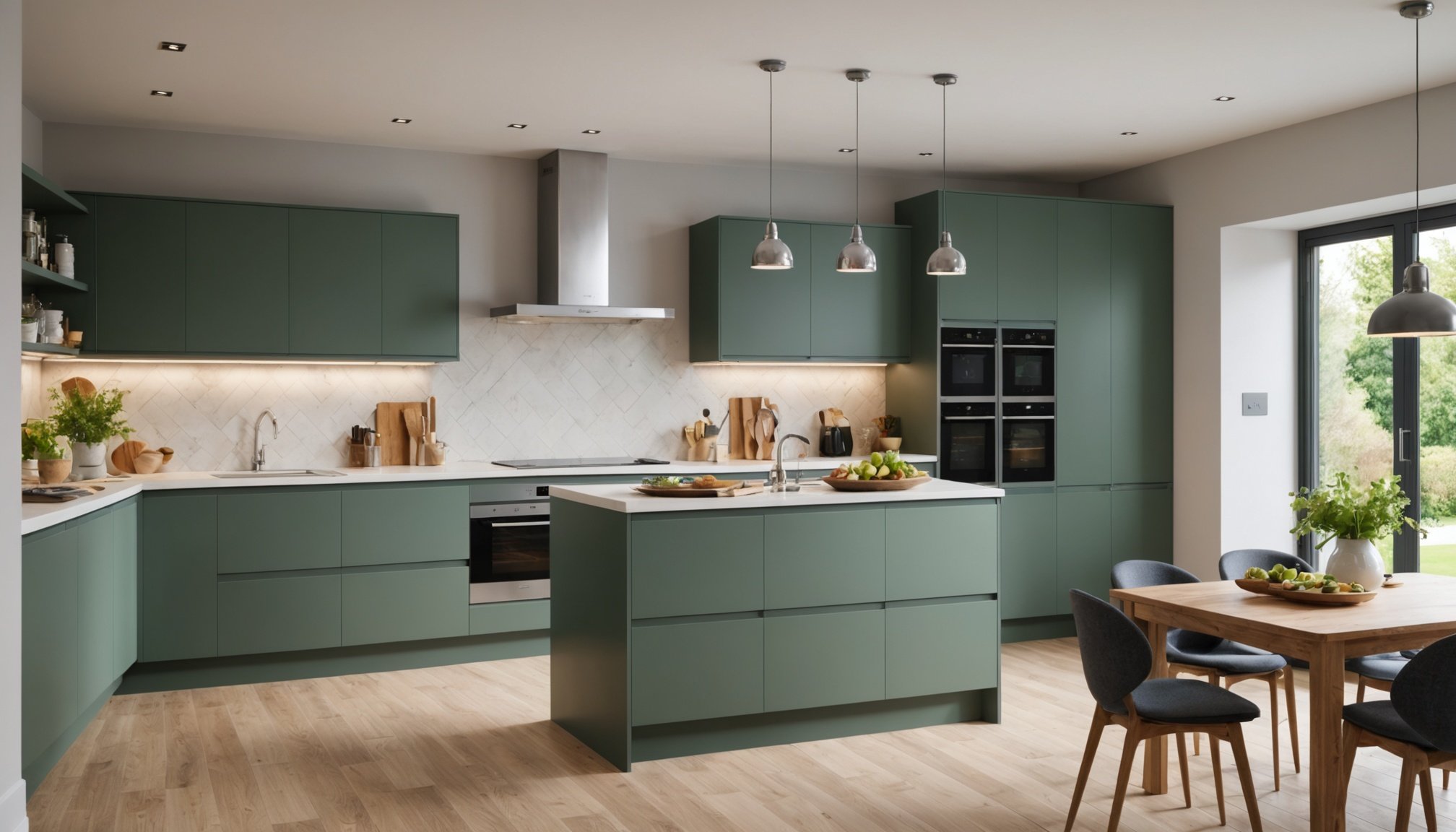Is your kitchen ready for a transformation? Embracing eco-friendly and energy-efficient practices can significantly reduce your carbon footprint while enhancing your cooking space. With the UK’s rising energy costs and environmental concerns, it's time to rethink how we utilize our kitchens. Discover practical tips that not only cultivate a sustainable environment but also promote cost savings and improved functionality. Let's create a kitchen that reflects your values and supports a greener future.
Eco-Friendly Materials for Kitchen Renovations
When planning a kitchen renovation, selecting eco-friendly kitchen materials is crucial for both the environment and your home's aesthetic. In the UK, a variety of sustainable materials are available to create stylish and environmentally conscious kitchen spaces.
A lire en complément : Elevate your space: must-have luxury décor for homes and yachts
One popular choice is reclaimed wood, which not only adds character but also reduces the demand for new timber. By using wood that has been previously used in construction or other applications, homeowners can enjoy unique textures and histories in their kitchen designs. Additionally, recycled materials like glass or metal can be repurposed into stunning countertops or backsplashes, offering durability and a modern look.
To source these materials, consider exploring local suppliers who specialise in green building supplies. These suppliers often have a vast selection of sustainable options, ensuring that your renovation aligns with eco-friendly principles. Many UK-based companies focus on providing materials that are both high-quality and environmentally responsible.
A lire en complément : Indulge in opulence: luxury home & yacht décor essentials
By choosing eco-friendly kitchen materials, you not only contribute to a healthier planet but also create a space that reflects your commitment to sustainability. This approach not only benefits the environment but also enhances the overall appeal and value of your home.
Energy-Efficient Appliances and Technologies
Incorporating energy-efficient kitchen appliances is a significant step towards creating a sustainable kitchen. When selecting these appliances, pay attention to energy ratings. These ratings, often displayed as labels, help determine how much energy an appliance consumes. Opt for models with high ratings to ensure greater efficiency and lower electricity bills.
Smart kitchen technology is another innovation enhancing energy savings. Smart fridges, ovens, and dishwashers can be programmed to operate during off-peak hours, reducing energy consumption. Additionally, these appliances often come with features like energy usage tracking and remote control via smartphone apps, providing convenience and further energy savings.
When it comes to eco-friendly appliances, several brands stand out for their commitment to sustainability. Brands like Bosch, Samsung, and LG offer a range of products designed with the environment in mind. These companies focus on reducing carbon footprints through energy-efficient designs and sustainable manufacturing processes.
Choosing energy-efficient kitchen appliances not only benefits the environment but also contributes to long-term savings. By investing in smart technology and eco-conscious brands, homeowners can enjoy a modern kitchen that aligns with their sustainability goals while maintaining functionality and style.
Sustainable Practices in Kitchen Operations
Incorporating sustainable kitchen practices is essential for reducing environmental impact. One effective approach is adopting a zero waste kitchen mindset. This involves strategies like meal planning to minimise food waste and composting organic scraps. Composting not only reduces landfill contributions but also enriches soil for gardening.
Eco-friendly cooking methods can further enhance sustainability. Opt for energy-efficient appliances, but also consider techniques like batch cooking. Cooking multiple meals at once reduces energy use, as does using lids on pots to speed up cooking times. Pressure cookers and slow cookers are excellent for energy conservation.
Incorporating seasonal and local ingredients is another impactful practice. Local produce requires less transportation, reducing carbon emissions. Seasonal foods are often fresher and more nutritious, supporting local farmers and the economy. A visit to the local farmer's market can help you discover what's in season and plan meals accordingly.
By embracing sustainable kitchen practices, you contribute to a healthier planet while enjoying fresh, delicious meals. These small changes can make a significant difference, aligning your cooking habits with eco-friendly principles.
Understanding Local Regulations and Incentives
When planning an eco-friendly kitchen renovation, it's vital to understand the UK green building regulations. These regulations ensure that renovations meet specific energy efficiency standards, promoting sustainability in homes. Familiarising yourself with these guidelines can help you make informed decisions about materials and appliances, ensuring compliance and maximising energy savings.
There are numerous eco renovation incentives available in the UK to encourage sustainable home improvements. Homeowners can access grants and financial support for projects that enhance energy efficiency. These incentives often cover a portion of the costs for installing energy-efficient appliances or using sustainable materials. Exploring these options can significantly reduce the financial burden of eco-friendly renovations.
Navigating the process of obtaining permits and approvals for kitchen upgrades can be complex. However, understanding local requirements is crucial to avoid potential setbacks. It's advisable to consult with professionals who specialise in sustainable renovations to ensure all permits and approvals are secured. They can provide guidance on adhering to regulations and accessing available grants.
By staying informed about energy efficiency grants and regulations, homeowners can effectively plan eco-friendly renovations. This knowledge not only supports compliance but also enhances the sustainability and value of your home.
Visual Aids and Case Studies for Inspiration
Exploring kitchen renovation case studies can provide valuable insights into transforming your space sustainably. These case studies showcase successful eco-friendly kitchen remodels, illustrating how others have integrated sustainable practices and materials effectively. By examining these examples, you can gather ideas on layout, materials, and appliances that align with your sustainability goals.
Visual inspiration eco-friendly kitchens often include before and after transformations, highlighting the impact of sustainable choices. These visual guides can inspire your renovation, offering a clear picture of potential design changes. Seeing how reclaimed wood or recycled materials are used creatively can spark ideas for your project, ensuring a balance between functionality and aesthetics.
For those interested in DIY projects, these case studies offer practical tips for achieving sustainable outcomes. Whether it's creating a backsplash from recycled glass or repurposing old cabinets, these examples demonstrate how to incorporate eco-friendly elements into your renovation. By following these tips, you can achieve an eco-friendly kitchen that reflects your personal style and commitment to the environment.
Utilising these resources not only aids in planning but also empowers you to make informed decisions, ensuring a successful and sustainable kitchen renovation.












